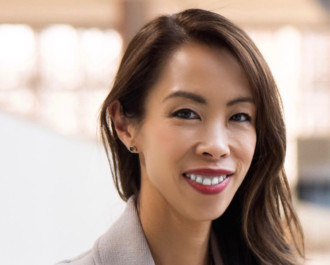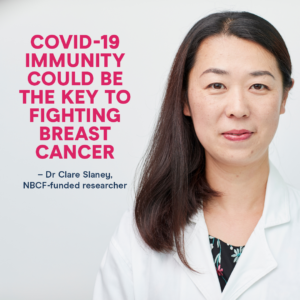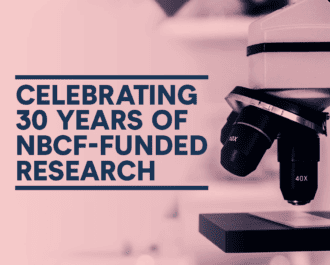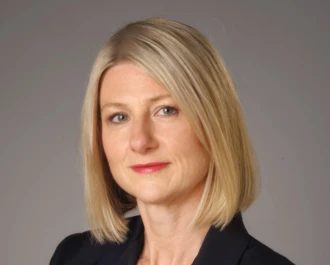 Treat
Treat
On the three-year anniversary of the declaration of the COVID-19 pandemic, the National Breast Cancer Foundation (NBCF) is announcing funding to researcher Dr Clare Slaney to explore using COVID-19 immunity to treat breast cancer.
Dr Slaney and her team at the Peter MacCallum Cancer Centre and the University of Melbourne are working on ways to improve chimeric antigen receptor (CAR) T therapy, a type of immunotherapy.
While CAR T therapy has shown great promise in some blood cancers, to date, it has not proved to be as effective for solid tumours like breast cancer. The opportunity that this research presents is identifying a mechanism capable of generating CAR T cells using COVID-19 viral specific T cells that already exist in most people after the pandemic.
As most of the world now have COVID-19 specific ‘memory T cells’ through exposure to the SARS-COV2 virus or through vaccination, this presents a new opportunity to engineer these immune cells to recognise and fight breast cancers.
Dr Slaney and her team will collect COVID-19 memory T cells from people who have been infected and/or been vaccinated against COVID-19. By re-engineering these cells to recognise specific breast cancer surface proteins, these T cells could be used to fight breast cancers. Because these T cells already recognise the COVID-19 virus spike protein, they can be activated by a COVID-19 vaccine.
NBCF-funded researcher Dr Clare Slaney, Peter MacCallum Cancer Centre, said, “The initial idea came to me as I was sitting at home frustrated in the early stages of the pandemic, unable to access my lab, watching my colleagues in infectious diseases working so hard to fight the SARS-COV2 virus.”
“I suddenly thought can we leverage this virus to do something useful. When the COVID-19 vaccines emerged, I had the idea that we just might be able to use COVID-19 immunity and vaccines to fight breast cancer. The early indications have been extremely promising, and I am so grateful that NBCF is supporting novel research like mine.”
If successful, this project will provide a substantial breakthrough in cancer treatment, helping NBCF towards their vision of Zero Deaths from breast cancer.
Associate Professor Cleola Anderiesz, CEO of NBCF said, “As a completely community-funded organisation, NBCF’s dedication to research relies solely on Australian donations. Since NBCF’s inception in 1994, the death rates from breast cancer have reduced by 43% thanks in large part to investment into research like Dr Slaney’s and the application of these findings into clinical practice.”
“But the job’s not done, and it is due to the Australian public’s generosity that we can continue taking one step closer to Zero Deaths from breast cancer.”
Jessica Pugliese-Thompson, 29, was diagnosed with invasive Grade 2 HER2 negative breast cancer in March 2022, just weeks after getting married. Jessica has her breast cancer treatment during the pandemic and worked tirelessly as a nurse throughout the pandemic.
Jessica said, “Due to COVID-19 restrictions I actually got the news I had breast cancer on my own, which was really tough, and going through treatment during the pandemic was also very hard. But hearing that thanks to research, COVID-19 might actually hold the key to fighting breast cancer is so exciting.”
You can support game-changing breast cancer research and help NBCF reach Zero Deaths from breast cancer today. Find out more here.
More News Articles
View all News Treat
Treat


